Murray-Boyles has tough task in first NBA start
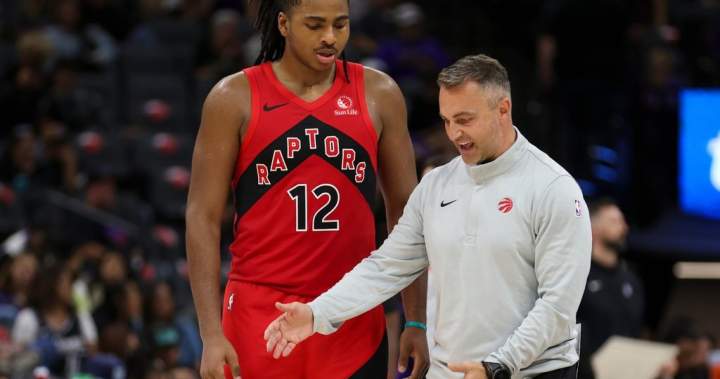
TORONTO – Collin Murray-Boyles doesn’t think he’s had his “welcome to the NBA” moment just yet, but he’ll never forget the first time he tangled with the Houston Rockets.
Murray-Boyles started for the first time in his NBA career on Wednesday, playing at centre for the Toronto Raptors in a 139-121 loss to Houston. That meant playing defence against former leading scorer Kevin Durant, former all-star Alperen Sengun, Jabari Smith Jr., backup centre Steven Adams, all of whom are over six-foot-10.
“That’s a great challenge, especially early on, especially for this team, going up against a team that’s going to make it really deep in the playoffs,” said Murray-Boyles. “You never know what type of lineup you’re going to go up against every night.
“Going up against a supersized line like this showed us what we need to do better, what we did good, and we can watch and see how we can improve.”
Murray-Boyles was taken ninth overall by Toronto in this summer’s NBA Draft. The six-foot-seven 20-year-old has only played in three games so far this season.
Related Videos
Although Durant — a surefire Hall of Famer who has been named an all-star 15 times — would theoretically be the toughest Rockets player for Murray-Boyles to guard, it was Adams who caught his attention.

Get breaking National news
For news impacting Canada and around the world, sign up for breaking news alerts delivered directly to you when they happen.
“Steven Adams is insanely strong. My wrists are sore right now. I’m trying to box him out and tussle with him and it’s impossible,” said Murray-Boyles, rubbing his forearms. “I didn’t think it was like that. Nobody gets over his screens.
“I was asking him what his routine is mid game. It’s insane. It’s insane. There’s him and then you have to worry about him and KD. It’s crazy what they got.”
Murray-Boyles’s first-ever NBA start was necessary as Jakob Poeltl, Toronto’s usual starting centre, was ruled out hours before the opening tip-off with lower back stiffness. Murray-Boyles finished with 13 points and two assists over 25 minutes, briefly getting benched after he got four personal fouls.
“We had to start Collin, Collin played in just his third game and he was already starting in the game tonight,” said Raptors head coach Darko Rajakovic. “Without Jak, who’s supposed to help us with rebounding, and controlling the paint, and then do all of that, it puts all the guys in different roles on our second unit.
“(The reserves) are still searching for those combinations, and how those guys can help each other. I think their energy is good. They really trying in games like today, they’re just smaller. They punked us on the glass.”
At different points in the night, Houston was able to put five players out on the court who are all over six-foot-10, at least an inch taller than six-foot-nine Sandro Mamukelashvii, Toronto’s tallest healthy player.
The size advantage held by Smith (6-11), Durant (6-10), Sengun (6-11), Adams (6-11), and Clint Capela (6-10) over the entire Raptors roster allowed them to out-rebound the hosts 53-22.
Houston also outscored the Raptors 66-36 in the paint and the Rockets bench had 37 points to Toronto’s reserves getting 23.
“That’s what comes with it. You’ve got to be more gritty,” said Murray-Boyles. “They had all five crashing sometimes, we had three, two, but we never had all five crashing.
“Some of that falls on me. But we’ve got to be more gritty on the rebounds, try to be as physical as possible throughout the whole game, not giving them anything easy around the rim.”
This report by The Canadian Press was first published Oct. 29, 2025.
© 2025 The Canadian Press

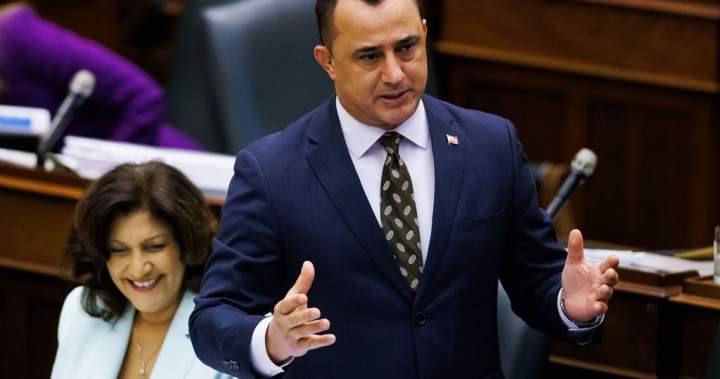
When Ashley Ferreira’s five-year-old son was diagnosed with autism in 2020 she never imagined that a five-year wait lay ahead for him to get access to government-funded core therapies.
“I thought that the diagnosis came with help,” she said. “It wasn’t until I started joining Facebook groups like the Ontario Autism Coalition that I was like, ‘Oh.’ It was a slap in the face.”
Families had been reporting wait times for access to core services under the Ontario Autism Program creeping upward in the past several years, so advocates set about doing a survey of the community.
Families starting to receive funding now to pay for core therapies including applied behaviour analysis, speech language pathology and occupational therapy are people who registered for the program five years ago, the survey found.
Children, Community and Social Services Minister Michael Parsa refused to say whether that is an acceptable length of time.
“We want to make sure that every family is supported, every child and every youth in this province has the opportunity to succeed and thrive,” he said when asked outside the legislature last week.
Figures obtained by the coalition through a freedom-of-information request show that more than 84,000 children are registered in the Ontario Autism Program to seek autism services and 19,600 of them are receiving funding to access core services.
Parsa touted the government’s record of more than doubling the budget for the autism program — to an expected $778 million this year — and expanding the services that qualify for funding as core therapy to include occupational therapy, speech language pathology and mental health supports.

As well, the Progressive Conservative government has introduced “pillars” families can access on a time-limited basis as they wait for funding for core services, including an entry-to-school program, urgent response services and support training for families.
But Ferreira said they were not relevant for her son, and what he really needed was the core services.

Get daily National news
Get the day’s top news, political, economic, and current affairs headlines, delivered to your inbox once a day.
“I see the pillars as Band-Aid solutions,” she said. “They’re not continued support. Our children need continued support.”
Ferreira’s family has been paying out of pocket for the past five years for therapy for her son while she waited for government funding, accruing more than $100,000 in debt, she estimates.
“We’ve been paying out of pocket for five years for early intervention,” she said. “So he’s thriving at the moment, no thanks to the government.”
Ontario Autism Coalition president Alina Cameron said the government’s autism program is not providing enough help for the children who need it.
“Based on the 2021 Stats Can census, there are at least one in every 32 children in Ontario who are autistic,” she said at a recent press conference.
“That’s not rare. That’s a population, and right now it’s a population being failed by this government. There’s a human cost. Families are paying the price. Our survey found that a staggering percentage of autistic children and youth, 44 per cent, have at least one parent or caregiver who cannot work because of the demands of care.”
NDP critic Alexa Gilmour said the autism coalition’s survey is eye opening.
“It is a damning picture that it paints of the Conservative government that is utterly failing our most vulnerable children and families,” she said at the press conference.
“It’s asking them to trust in a safety net that isn’t there to catch them, that they have refused to provide. Less than one quarter of children registered for the Ontario Autism Program have been given access to the therapy that they were promised.”

© 2025 The Canadian Press
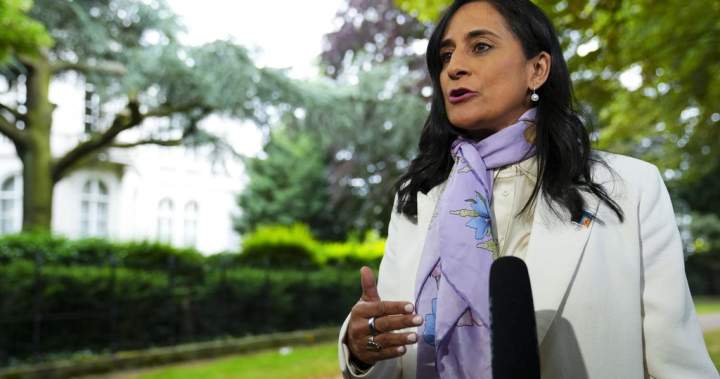
Foreign Affairs Minister Anita Anand said Wednesday she was looking into how Canadian rifles have ended up in the hands of Russian snipers.
The minister made the announcement after Global News reported that Quebec-made guns prized by snipers were turning up in Russia despite sanctions.
“I’m actually looking into this issue and others right now,” Anand, whose department is responsible for sanctions, told reporters in response to a question about the report.
She said Canada had among the world’s most advanced military export controls, and “we will be monitoring and taking these types of claims very seriously.”
The Global News investigation found that Canadian rifles have been appearing increasingly in photos on Russian social media channels.
While some of the guns were identified as having been captured on the battlefield, others appeared brand new and still had their product tags.
Russian social media channels also show Canadian-made rifles being used by decorated snipers who fought against Ukraine, one of whom was credited with 100 kills.
The manufacturer of the rifles, Cadex Defence, said his company did not export to Russia and that it strictly followed Canada’s export laws.

Get breaking National news
For news impacting Canada and around the world, sign up for breaking news alerts delivered directly to you when they happen.
After looking into the issue, the company said it traced 10 rifles identified in Russian customs documents to a shipment it sent to the U.S. and then cut off the American purchaser.
A senior government source said the Canadian government had issued only a single permit to export to Russia, in 2013, for a rifle stock, not a firearm.
“Cadex rifles in Russian hands were possibly acquired either via battlefield loss from Ukrainian forces who are being supplied with some Cadex rifles, or via illicit acquisition through third countries,” the source said.

Although sanctions imposed after President Vladimir Putin invaded Ukraine prohibit selling arms to Russia, it has still been able to acquire weapons by moving imports through various countries.
Ambassador of Ukraine to Canada Andrii Plakhotniuk said a “thorough investigation” was warranted whenever weapons or other military goods or technology had flowed to Russia.
“Ukraine fully supports the continued strengthening of the sanctions regime, including tighter monitoring and end-user controls, to prevent the aggressor state from obtaining weapons or dual-use technologies and deprive Moscow of possibilities to circumvent sanctions,” he said.
Opposition foreign affairs critic Michael Chong said it was the federal government’s responsibility to ensure that Canadian military goods do not fall into the hands of adversaries.
“Yet under the Liberals, we’ve seen detonators used in Russian landmines, turbines shipped for Russian pipelines and avionics supplied for Russian drones — all helping Putin’s war effort,” he said.
He said the government had “failed to deliver” on promises to tighten sanctions enforcement and must ensure that “our military exports don’t end up helping Putin wage war against Ukraine.”
The NDP, meanwhile, said it was “deplorable” that Canadian arms had gone to Russia and called on the government to “improve and to truly enforce sanctions against Russia.”
“Transit countries, or transit companies, should not be used to ignore or get around sanctions and legal obligations,” said foreign affairs critic Alexandre Boulerice.
© 2025 Global News, a division of Corus Entertainment Inc.
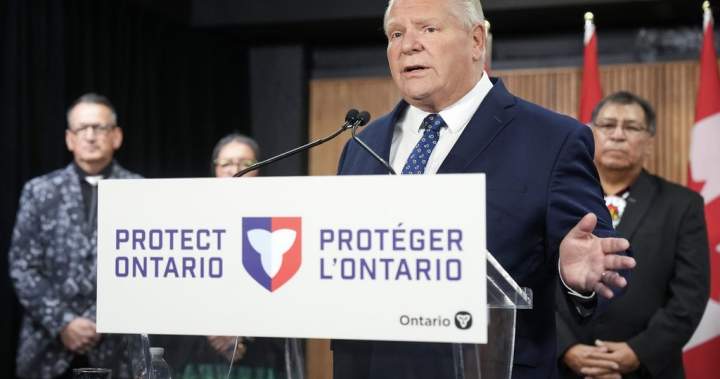
Ontario Premier Doug Ford has a simple message to Quebec doctors amid their ongoing compensation dispute with the provincial government: “Call me.”
“Call 1-800-Doug Ford, all the docs and come by, call me on my cellphone, it’s on the internet, people are taking advantage of it now,” Ford said Wednesday. “Come by and we’ll have you working real quick. I’d love to see the doctors, nurses, would like to see anyone in health care come to Ontario because we’re a growing community.”
The premier’s comments come amid an ongoing dispute doctors are having with the Quebec government over a controversial bill that changes how they’re paid.
In response, Premier Francois Legault said late Wednesday Ford’s comments were “totally unacceptable,” adding the Ontario premier was showing “a complete lack of judgment.”
Legault said his government is trying to bring significant changes to the health system, a delicate and emotional issue, particularly for doctors.
“We all have major challenges in improving our health care systems in all provinces,” Legault said. “This is not the time for provinces to be undermining each other. It’s time to work together.”
Bill 2 was passed over the weekend in Quebec, which will see a portion of doctors’ compensation linked to performance targets related to the number of patients, particularly vulnerable ones, they care for.
Legault called a special session to rush through the bill, which imposes fines of up to $20,000 per day on doctors who take “concerted action” to challenge the government’s policies.

Such actions could include groups of three or more doctors refusing to teach medical students or deciding to leave the public health system or move to another province.

Get weekly health news
Receive the latest medical news and health information delivered to you every Sunday.
Doctors say the bill amounts to a pay cut and medical specialists on Tuesday said they’re planning a legal challenge, saying it violates individual freedom.
Despite the threat of fines for leaving the province, some have already been considering a move.
The College of Physicians and Surgeons of Ontario told Global News in an email that as of Wednesday, it has received 70 applications for licensure since Oct. 23 from physicians from Quebec. The CPSO said the applications were for either a restricted or independent practice certificate in the province.
“These applications for licensure are currently in progress for the indicated period in 2025; some may be withdrawn or cancelled, so the number does not necessarily reflect the number of physicians who will ultimately be granted a certificate of registration from CPSO,” said a spokesperson for the college.
It added the data does not disclose reasons for the doctors to seek licensure to practice in the province.
For context, the CPSO said it received 19 applications between June 1 and Oct. 22.
Quebec doctors have also been eyeing New Brunswick as another option.
According to New Brunswick’s College of Physicians, the number of Quebec doctors seeking to obtain a licence in the Maritime province was in the low single digits all year. There were three in January, for example, and three in August.
So far this month, that number has spiked to 34.
Vitalite Health Network has also published a new Facebook advertisement, encouraging Quebec doctors to move to the Maritime province and the network says it’s received formal expressions of interest.
“Quebec doctors are continuing to look at New Brunswick as a healthy place to work, be respected, work across teams,” said New Brunswick Health Minister John Dornan.
Though Dornan added no one should be trying to attract already established doctors with incentives like higher pay, but said if people decide to come because they’ve showcased what the province has it’s “perfectly acceptable.”
While some doctors have started looking to other provinces, medical organizations like the Canadian and Ontario Medical Associations are raising concerns.
“When there is a shortage right across Canada, where one in five do not have access to a primary care provider, physician, or nurse practitioner, there’s a great need to keep as many of the physicians you have within every province practicing and enjoying their practice and being able to give their best to patients,” said Dr. Margot Burnell, president of the Canadian Medical Association.
A spokesperson with the Ontario Medical Association echoed Burnell’s sentiments.
“There is a doctor shortage across Canada, and all patients deserve access to physician care,” the OMA wrote. “The OMA has been working with the government to improve physician mobility across Canada, but we do not want to compromise the ability of Canadians to access care by fixing a problem in one province by creating an issue in another.”
Asked what would be the selling points for doctors to come to Ontario, Ford told reporters they’d “roll out the red carpet for you.”
“We’ve already hired over 16,000 doctors, we’re paying for their education in medical school, we’re adding more medical schools,” Ford said. “But the seasoned veteran docs, best quality of life you’ve ever have come by. We’ll roll out the red carpet for you.”
Ford added that Ontario has a “rich” Francophone culture, saying Ontario has more than 600,000 Francophones.
—with files from Global News’ Rebecca Lau, Anna Mandin and Suzanne Lapointe and The Canadian Press

© 2025 Global News, a division of Corus Entertainment Inc.
-

 Uncategorized5 months ago
Uncategorized5 months agoShop Proud, Eat Proud, Be Proud — Ottawa Canada Day Market This June 28th
-

 5 months ago
5 months agoRing of Fire road to bring prosperity to First Nation, problems for caribou: report
-

 5 months ago
5 months agoMeasles circulating in northeastern B.C. community, health officials warn
-

 5 months ago
5 months agoCanada’s world junior trial saw juries tossed, intense testimony. Here’s a recap
-

 5 months ago
5 months agoFormer major leaguer, Jays doctor Ron Taylor dies
-

 4 months ago
4 months ago161 bricks of suspected cocaine found on truck trying to cross Canada-U.S. border
-
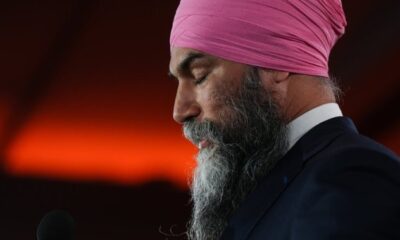
 5 months ago
5 months agoJagmeet Singh apologizes for attending Kendrick Lamar concert after Drake calls him out
-
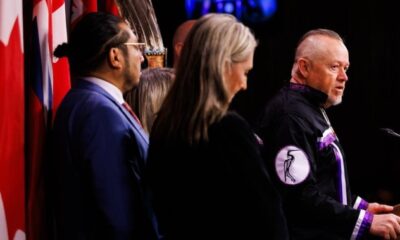
 5 months ago
5 months agoAnishinabek Nation chief says he briefed Ontario police on protests against Bill 5






